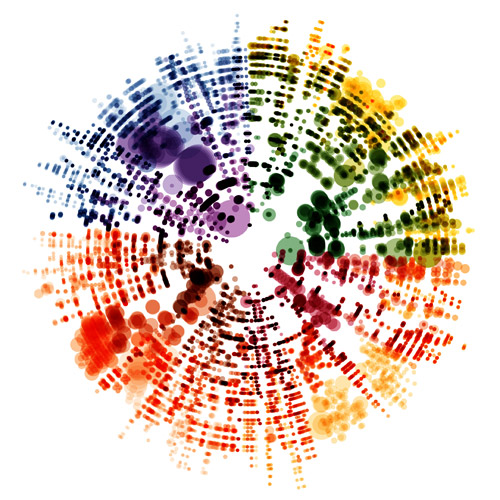Leaders who shape us
It’s the day after (American) Thanksgiving, so to begin, a word of thanks: thank you to the great bosses I have had over my career so far.
However you define leadership, it’s clear that good leaders possess a je ne sais quoi that is often elusive: an ability to make you feel valued and included, while also feeling led. That feeling can manifest itself in many different ways, but it is core to the idea of good leadership.
Not everyone I have worked for in the past has been a good leader—some people are promoted to leadership roles when they are great at their subject matter, as a form of promotion, instead of when they are great at leading people—but I have been lucky to have had my fair share of excellent bosses. My career trajectory, my personal growth, and my sense of value in the work I do are all shaped by these leaders: people who trusted me to do good work, but guided me to doing even better.
So, now, a quick thank you to a few people that need to be mentioned by name:
- Mike Matyjiw
- Beth Jefferson
- David Tallan
- Nicole Frost
- Angie Gentile
- Amin Ladak
- Zeena Abdulla
- Ilse Treunicht
- Tannis Fenton
- Tanya Coyle
- Hillary Hartley
We are all shaped by the people who lead us; I am so lucky to have leaders like the ones above who have helped make me who I am.
Atlas Obscura recently launched their food publication, Gastro Obscura, a database of curious and unusual food and drink. It is a food section is devoted to wonder and curiosity, but more than that, it’s a reminder that the things we eat, what we consume, are more than just fuel and sustenance: they are art and science and whimsy and magic, all packaged into every bite.
I’ve been reading a lot of great writing about food this week—some in Gastro Obscura, some elsewhere—and thought it might be nice to share some of the most thought-provoking pieces with you.
The first, perhaps unsurprisingly, is about apples. I’ve always been fascinated by apples and how they are grown and bred; one of my life dreams is to visit the Cornell University Agricultural Experiment Station.
If an apple is a candidate for commercialization, those budding clones are grafted onto different roots, to see how they grow and produce, and then are sent into grower trials, to see how they fare in other conditions. In one field we pass, Brown points out her “advanced selections”—trees laden with big apples, like overdecorated Christmas trees. They’ve been bred to stand straight, with branches starting lower to ground, which makes harvest easier. In between the clusters there are large gaps, where underperforming trees once stood.
“Somebody said, ‘Your apples are your children,’” says Brown. “I must be a tough mother then, because if it doesn’t perform, it’s gone.”
Having grown up not having much exposure to Asian (specifically, East and Southeast Asian) cuisine, the piece in the New York Times about the struggles of Asian-American chefs and the expectations of the market was fascinating.
It’s the eternal plea of the minority, to ask to be judged not by one’s appearance or the rituals of one’s forbears but for the quality of one’s mind and powers of invention. Certainly our country was predicated on the right to shed one’s past and be reborn, to come from nothing and work your way up; in this, Asians may be among the most American of Americans. But why is the choice always between exotic caricature or rootlessness? The philosopher Slavoj Zizek argues that the embrace of “ethnic” restaurants is merely “tolerance” of a “folklorist Other deprived of its substance”: “The ‘real Other’ is by definition ‘patriarchal,’ ‘violent,’ never the Other of ethereal wisdom and charming customs.” Too often Asian-American chefs are presumed to double as educators or ambassadors, representing an entire race, culture or cuisine.
In the end, doesn’t it matter — not to others, but to ourselves — where we are from? And no, I don’t mean “originally.” I mean the forces that made us: the immigrants who raised us, with all their burdens and expectations, their exhortations to fit in but never forget who we are; and the country we grew up in, that is our only home, that taught us we are “other” but also seems, in some confused, tentative way, to want to learn something from us.
There are very few flavours that turn me off like rosewater does, which is why I was completely shocked that it once was a staple of North American baking until it was usurped by vanilla.
Food trends are as old as food itself, and evolve from generation to generation. While rosewater is considered an exotic ingredient nowadays, it didn’t use to be. Up until the 1840s, nearly every pie, cake, and cookie recipe called for a dash of rosewater—an addition that gave desserts a subtle floral aroma and a slightly earthy taste.
America had a taste for rosewater because England had a taste for rosewater, and England had a taste for rosewater because of The Crusades. “All the Crusaders marched off to the Middle East to defeat the infidels. What they did was they picked up an awful lot of Middle Eastern foodways,” says Sandy Oliver, a colonial food historian. The Crusaders became particularly fond of desserts that used rosewater and orange blossom water. When they returned home, they made rosewater by steeping fragrant roses in water. Then the English brought rosewater with them when they sailed to America.
Something I’ve been learning more about recently is the co-opting of cuisine and culture; while I never used to think much about who owned the restaurants I visited, and instead focused on the type of food, articles like this one about Detroit’s whitewashed culinary scene have made me think more about who really benefits from urban culinary growth.
Generally, revitalization efforts in many Downtown districts are cast as rebellious and different from previous suburbanization and blatantly racist policies that created the current malaise of urban communities of color. These efforts pretend to prioritize community engagement and equitable development over speculation and profiteering by adopting the slang of inclusion and diversity. But because they tend to define community in racially and economically exclusionist terms, this version of “revitalization” is in the same tradition of its forbearers: urban renewal and segregation. Downtown Detroit’s revival was never reflective of the city. It was designed for a segment of like-minded people indulging self-serving interests, all the while performing a drama of progress that reinforced racial and classist hierarchies.
It was a beautiful time, a beautiful place—but only if you were white and college-educated, or simply white, or just proximate to the right white people, some of whom were turning tragedy into restaurants.
Moving to a smaller city has made me realize just how different the smell, feel, and taste of the air can be from place to place. Smog meringues are an interesting way to “taste” the air around the world.
You wouldn’t think it, but cities have tasting notes, too. Each has a unique smog bouquet. If the smog is from Los Angeles—authorities call it Angelina smog—you’ll sense bleach and other cleaning products. London smog has a mouthfeel redolent of dirt. Atlanta smog has oleaginous notes of alcohol. And Beijing? “A lot more sulfurous,” says writer and journalist Nicola Twilley. “It has that kind of fart smell going on.” In a blind taste test, she says, you’d be able to tell the difference between them, but you might struggle to identify each one’s source, “unless you were a connoisseur of smog.”
Can you think of three foods where any two of those foods taste good together, but all three combined taste disgusting? It’s an interesting exercise—I can’t, off the top of my head—that’s explored in this fun article on the Incompatible Food Triad.
A few more things to read and explore:
Sometimes I wonder whether my experience of the world would be much different if I learned to speak Swahili fluently, like my parents and grandparents, and what I’m missing by not being able to see the world through that lens.
Mother tongue: the lost inheritance of diaspora, Derek Owusu:
I’m starting to feel that even if I learn my history and immerse myself in Ghana’s culture, because I can’t speak one of its main languages, I’ll never be able to fully understand a way of life and thought that is my inheritance. Because elements of cultures are codes that almost seem meaningless if you don’t have the key.
It’s common for people to say that you can’t translate a joke without the humour disappearing, but I also think it’s impossible to translate a word that describes a feeling or way of thinking without the word becoming meaningless to the person you’re trying to communicate with. And so along with the word, the behaviour isn’t understandable either.
Jesmyn Ward’s Sing, Unburied, Sing was easily the best book I’ve read this year (and I’ve read some pretty good stuff). I’m so very glad she won the National Book Award for Fiction, but even more glad that she’s working on even more fiction to come.
‘I’m Writing for Everybody Else, Too’: An Interview with Jesmyn Ward, Abigail Bereola:
One of the reasons that I wanted to write about voodoo or write about hoodoo is because I feel like in the larger culture—in American culture—voodoo is something that has been maligned and I think that black spiritual traditions were important and are still important, for many, for our survival. I come from an area where a lot of people are Catholics—I was raised Catholic—but yet in voodoo, you have this example, especially in New Orleans, of elements of African spiritual traditions melding with Catholicism. I think that voodoo and hoodoo were a way for people of African descent to feel as if they had some sort of power or control in their lives, especially when in every other aspect of their lives, they were denied that. I think that those traditions are really important to understanding how we survived, how we exerted control, how we assumed some power, how we claimed some agency for ourselves throughout the hundreds of years that our ancestors were enslaved. So, I wanted to push back against that understanding of voodoo, of hoodoo, of that kind of black spiritual tradition, so that people are better aware of how it, again, helped us to thrive and how it helped us to fulfill some really deep-seated human needs that we had.
There are many things my dad taught me, but a few things he pushed on me very hard was to never be late, to never be absent-minded, and to always, always, always honour any commitment or promise. I will always be so thankful that these were so important to him, and now, to me.
Absent-mindedness as dominance behaviour, Joseph Heath:
Pierre Bourdieu used to complain about what he called the “ideology of natural taste” in the domain of aesthetics. People treat their own “taste” as thought it were merely a given, a fact about them, or something dictated by the world. And yet this taste just happens to coincide — miraculously! — with their precise class position and status ambitions. The same is true with respect to absent-mindedness. People treat it as a feature of their brains, that they are powerless to control, and yet those who exhibit the trait just happen to find themselves — miraculously! — in the privileged social position where they suffer no adverse consequences from these lapses of memory.
We recently re-subscribed to the paper delivery of The Globe and Mail. It’s one of many things we’ve done recently to make life a little more analog; I’m not sure why the draw to the analog is so strong now, but it is palpable.
Our Love Affair With Digital Is Over, David Sax:
Analog, although more cumbersome and costly than its digital equivalents, provides a richness of experience that is unparalleled with anything delivered through a screen. People are buying books because a book engages nearly all of their senses, from the smell of the paper and glue to the sight of the cover design and weight of the pages read, the sound of those sheets turning, and even the subtle taste of the ink on your fingertips. A book can be bought and sold, given and received, and displayed on a shelf for anyone to see. It can start conversations and cultivate romances.
The limits of analog, which were once seen as a disadvantage, are increasingly one of the benefits people are turning to as a counterweight to the easy manipulation of digital. Though a page of paper is limited by its physical size and the permanence of the ink that marks it, there is a powerful efficiency in that simplicity. The person holding the pen above that notebook page is free to write, doodle or scribble her idea however she wishes between those borders, without the restrictions or distractions imposed by software.
As more and more creators are exposed for their monstrosities, we’re all left wondering what to do with their art. I haven’t figured out how to grapple with that myself, but I’m learning from others who are trying to wrap their heads around it too, especially other creators.
What Do We Do with the Art of Monstrous Men?, Claire Dederer:
A great work of art brings us a feeling. And yet when I say Manhattan makes me feel urpy, a man says No, not that feeling. You’re having the wrong feeling. He speaks with authority: Manhattan is a work of genius. But who gets to say? Authority says the work shall remain untouched by the life. Authority says biography is fallacy. Authority believes the work exists in an ideal state (ahistorical, alpine, snowy, pure). Authority ignores the natural feeling that arises from biographical knowledge of a subject. Authority gets snippy about stuff like that. Authority claims it is able to appreciate the work free of biography, of history. Authority sides with the (male) maker, against the audience.
Me, I’m not ahistorical or immune to biography. That’s for the winners of history (men) (so far).
Overnight in Walmart Parking Lots: Silence, Solace and Refuge:
I have an unabashed love affair with pop music. This video by Estelle Caswell does a really, really, really great job of describing why we love repetition in music:
Speaking of analyzing music with data, these classical music scores as data visualizations by Nicholas Rougeux are absolutely stunning.
I don’t take many panoramic photos, but these winners of the 2017 Epson International Pano Awards may just inspire me to take more.
And a few more:
- The Last of the Iron Lungs
- Your company’s Slack is probably sexist
- What’s Drake to Do When Toronto Isn’t Enough?
- Bail Bloc is a cryptocurrency scheme against bail
- Detroit Pistons Coach: Athletes Who Protest Are Patriots
- Hotels are finding out what amenities guests really want
- The beginning of silent reading changed humans’ interior life
- How One Woman’s Digital Life Was Weaponized Against Her
- Historically, men translated the Odyssey. Here’s what happened when a woman took the job.
Want to get this and future weekend reading links in your inbox instead of checking the blog? You can now subscribe to the newsletter.






